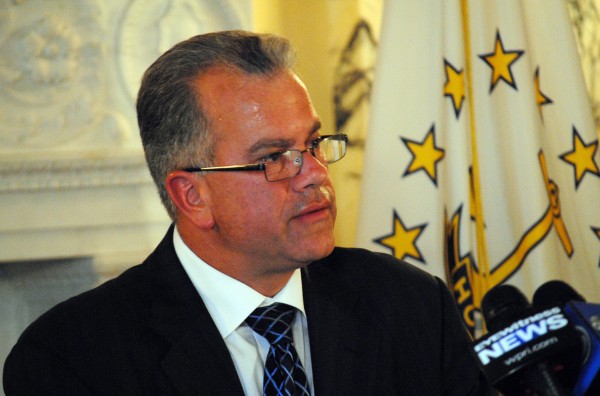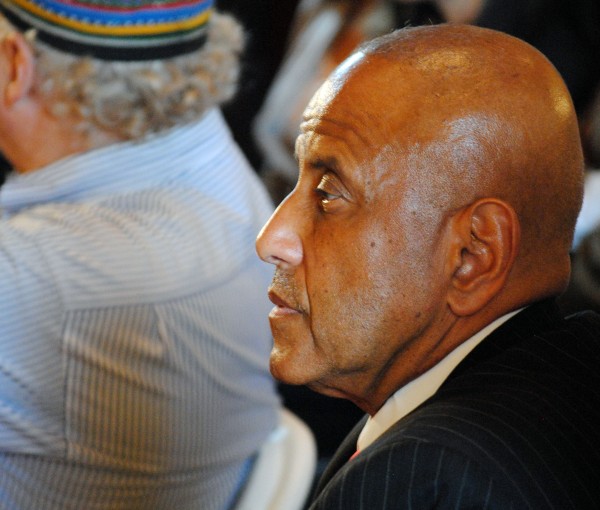
Governor Gina Raimondo launched an initiative to reinvent Rhode Island’s criminal justice system, with hopes of reducing recidivism rates, analyzing racial disparities within prisons, and properly treating addiction and mental illness. The initiative, known as the Justice Reinvestment Working Group, will work closely with The Pew Charitable Trusts, the U.S. Department of Justice’s Bureau of Justice Assistance, and the Council of State Governments to make the state’s criminal justice system more effective at a smaller cost.
Governor Raimondo compared the group’s creation to her Reinventing Medicaid task force that was brought together last year. Just as Rhode Island has the second highest enrollee cost for Medicaid in the country, Rhode Island also has the third highest probation rate in the nation, with 2,737 people on probation per 100,000 residents. One in 44 Rhode Islanders are on probation, and one in 21 Providence residents are on probation.
“Similar to Medicaid, we’re spending too much money, and not getting the outcomes that people deserve,” she said.
Half of state costs related to public safety are spent on the Department of Corrections, totaling in at around $408.5 million. Only 8 percent, or $15 million, of that budget goes to probation and parole services.
“Here’s the reality,” Raimondo said. “We have to direct our resources more effectively in the probation and parole system as well. If you’re trying to supervise everybody, you’re not really supervising anybody.”

The working group, which will be co-chaired by Rhode Island Supreme Court Chief Justice Paul Suttell, and retired Superior Court Associate Justice Judith Savage, puts together stakeholders in the system to study these issues, and create a set of recommendations to give to the state in several months time. They will look at what other states have done to improve their own systems, and use a data driven approach to create new standards for Rhode Island.
Although reducing costs is a large part of what the group hopes to accomplish, Governor Raimondo’s main focus for them is to create a more fair justice system. The working group will find ways to improve treatment for those who suffer from addiction and mental illness, rather than continually incarcerating them. They will also evaluate how to reduce the recidivism rate, which was 48 percent in 2009, as well as analyze racial disparities to figure out exactly who is being arrested and on what charges. According to Raimondo, without taking a serious look at these issues, the justice system becomes a revolving door, with prisoners returning over and over again.
“At the end of every statistic is a human being who deserves a fair shake, who deserves an efficient, effective, and honest criminal justice system, and who deserves another chance,” she said.

Speaker of the House Nicholas Mattiello also commented on the state’s probation and parole rate, saying that the sentences are too long, making Rhode Island an outlier among other states. Putting someone on probation or parole for too long, Mattiello said, will “take the wind out of their sails, and you take away their hope of becoming productive members of the community in the future.”
As a lawyer, Mattiello has seen sentences that have gone upwards of 20 or 30 years. These sentences create an unbalanced system that can affect someone for the rest of their lives.
“If you’re on probation for 30 years, sometimes that can put you into your 80’s,” he said, also adding that sometimes thoughtful, alternative sentencing options can be better than harsh ones.
“Those that are not the most dangerous and violent, may be better served with less severe and restricting sentencing options,” he said.
Savage, who served on the Superior Court for more than two decades, believes that her place on the working group is a way for her to give back to the state. She told the story of a man she called Michael that had been arrested for breaking and entering into a home while drunk, looking for a place to sleep.
“It would have been easy to send Michael to prison for breaking and entering, and be done with it,” she said. But, she made another choice to have him sent to treatment instead.
“We exchanged loads of prison dollars for treatment dollars, but more importantly, we helped Michael,” she said. “That’s what motivates me. I want to make this system work better for all of us.”
Savage spent last year teaching a symposium on mass incarceration at Roger Williams University Law School, where she was able to lead the discussion on how to solve issues that the working group plans to tackle.
“Together, I firmly believe that we can achieve greater justice,” she said.

While some of the speakers did not quite touch upon the question of racial disparity in the criminal justice system, James Vincent, the President of the Rhode Island NAACP, said that he believes the initiative will help the issue.
“I think this is something that is very needed in this state,” he said. “I’m particularly interested in the racial disparity aspect of the work we’re going to be doing, and hopefully we’ll end up in a much better state because of this effort.”
Vincent will be serving in the work group, along with other members of the legislative, judicial, and executive branches, as well as members of other groups throughout the state.
Governor Raimondo’s executive order is not the first action that the state has taken to reinvest in the justice system. In 2008, House Bill 7204 enhanced parole discretion and standardized credits for the first time someone has served. Since the bill was adopted, the incarcerated population has dropped 19 percent, along with the recidivism rate.


Deprecated: Function get_magic_quotes_gpc() is deprecated in /hermes/bosnacweb08/bosnacweb08bf/b1577/ipg.rifuturecom/RIFutureNew/wp-includes/formatting.php on line 4387
Deprecated: Function get_magic_quotes_gpc() is deprecated in /hermes/bosnacweb08/bosnacweb08bf/b1577/ipg.rifuturecom/RIFutureNew/wp-includes/formatting.php on line 4387
Deprecated: Function get_magic_quotes_gpc() is deprecated in /hermes/bosnacweb08/bosnacweb08bf/b1577/ipg.rifuturecom/RIFutureNew/wp-includes/formatting.php on line 4387